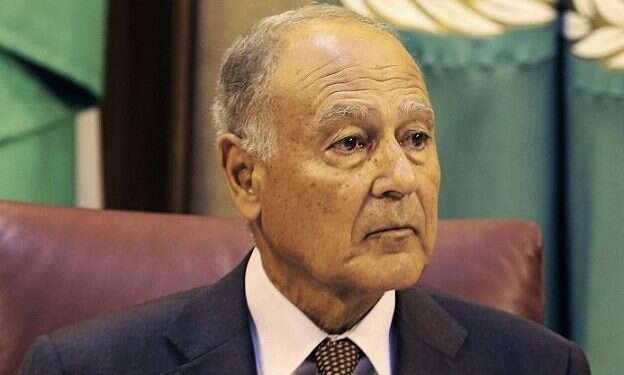An Arab League summit called on Sunday for an international investigation into the "criminal" use of chemical weapons in Syria and condemned Iranian interference in the affairs of other countries.
"We stress our absolute condemnation of the use of chemical weapons against the Syrian people and we demand an independent international investigation to guarantee the application of international law against anyone proven to have used chemical weapons," said a statement distributed to journalists following the summit.
The statement emphasized the need for a political solution to the Syrian civil war.
Saudi Arabia's King Salman told leaders from across the 22-member Arab League that Iran is to blame for instability and meddling in the region. He said the Houthi rebels in Yemen, backed by Iran, had fired 116 missiles at Saudi Arabia since the kingdom went to war in Yemen three years ago to try to roll back the Houthi gains there.
The summit took place in the oil-rich eastern Saudi city of Dhahran, a location that may have been selected by the kingdom to avoid cross-border Houthi missile strikes that have targeted the capital, Riyadh, and southern border cities.
Arab League Secretary General Ahmed Aboul Gheit said Syrian President Bashar Assad's government and "international players trying to achieve their own strategic political goals" bear responsibility for the crisis there.
"Regional interference in Arab affairs has reached an unprecedented degree. And first of these is the Iranian interference, the aim of which is not for the well-being of the Arabs or their interests," he said.
King Salman made no reference to Syria in his remarks at the summit, which came amid divisions within the Arab League over the weekend's U.S.-led airstrikes on Syrian military targets. Saudi Arabia, Bahrain and Qatar have issued statements backing the strikes, but countries including Egypt, Iraq and Lebanon are more wary of the widening conflict.
Assad was not invited to the summit, although most heads of state from across the Middle East and North Africa attended, including Sudanese President Omar al-Bashir, who is wanted by the International Criminal Court for alleged war crimes in Darfur.
Syria was suspended from the Arab League in November 2011 over the regime's brutality against its own people.
At the start of the summit, Aboul Gheit lamented the lack of consensus among Arab states on regional security.
"The crises burning in some corners of the Arab world today cast a shadow over the safety and security of the entire region," he said. "These take a toll on the national security of all of us."
The summit was critical of Iran's involvement in Syria, saying the military help given to Assad by Iran, Russia, Iran-backed Hezbollah in Lebanon and Iran-backed Shiite militias in Iraq has allowed him to crush the rebel threat to topple him.
The summit called for more international sanctions on Iran and urged it to withdraw "its militias" from Syria and Yemen.
"The summit condemned Iranian interference in the internal affairs of Arab countries, either through igniting sectarian strife or planting militias in Arab countries such as Lebanon, Iraq and Yemen, and harboring al-Qaida terrorists," Saudi Foreign Minister Adel al-Jubeir told a news conference.
Iran rejected the condemnation as the result of Saudi pressure.
"The heavy shadow of destructive Saudi policies is evident in ... the final statement of the summit," Iranian state media quoted Iranian Foreign Ministry spokesman Bahram Qasemi as saying.
Arab heads of state also used the summit to stress their unwavering support for the Palestinians.
King Salman reiterated Saudi Arabia's rejection of the U.S. decision to recognize Jerusalem as the capital of Israel and move the U.S. Embassy from Tel Aviv to Jerusalem.
However, despite the monarch's stern words, Saudi Arabia has strengthened ties with Washington under the Trump administration.
Al-Jubeir said "there is no contradiction" with having very strong strategic ties with the United States while advising against certain policies.
"The fact that we have very strong ties with the U.S. over history, and the Trump administration in particular, is a positive factor, not a negative factor, in trying to help guide them towards a positive engagement in the Middle East," al-Jubeir told reporters.
Saudi Arabia also announced a $150 million donation to the religious administration that oversees Jerusalem's Al-Aqsa mosque, as well as $200 million in relief funds for the PA, including $50 million for programs run by the U.N. relief agency for Palestinians, after the U.S. slashed its aid.
The strongest criticism of the Trump administration came from Palestinian Authority President Mahmoud Abbas.
The decisions to recognize Jerusalem and move the embassy have "made the United States a party to the conflict and not a neutral mediator," Abbas said at the summit.
Saudi tensions with neighboring Qatar were on display at the summit.
Tensions erupted nearly a year ago when Saudi Arabia, the United Arab Emirates, Bahrain and Egypt severed ties with Qatar and imposed a de facto blockade on the small Gulf state, accusing it of sponsoring terrorism because of its support for Islamist opposition groups in the region and its warm relations with Iran.
Qatar denies the allegations and says the blockde is an attempt to undermine its sovereignty.
Asked why Qatar was not on the summit's agenda, al-Jubeir said, "Because Qatar is not on the agenda. It's not a big issue. It's not a big problem. It's a very, very small problem."
He said the issue would be resolved if Qatar would meet the boycotting countries' demands to close the Al Jazeera television station and reduce ties with Iran.
Tunisia will host the next Arab League summit, in 2019.




